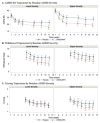Exploring longitudinal course and treatment-baseline severity interactions in secondary outcomes of smoking cessation treatment in individuals with attention-deficit hyperactivity disorder
- PMID: 29370538
- PMCID: PMC6060016
- DOI: 10.1080/00952990.2017.1416474
Exploring longitudinal course and treatment-baseline severity interactions in secondary outcomes of smoking cessation treatment in individuals with attention-deficit hyperactivity disorder
Abstract
Background: A double blind, placebo-controlled randomized trial (NCT00253747) evaluating osmotic-release oral system methylphenidate (OROS-MPH) for smoking-cessation revealed a significant interaction effect in which participants with higher baseline ADHD severity had better abstinence outcomes with OROS-MPH while participants with lower baseline ADHD severity had worse outcomes.
Objectives: This current report examines secondary outcomes that might bear on the mechanism for this differential treatment effect.
Methods: Longitudinal analyses were conducted to evaluate the effect of OROS-MPH on three secondary outcomes (ADHD symptom severity, nicotine craving, and withdrawal) in the total sample (N = 255, 56% Male), and in the high (N = 134) and low (N = 121) baseline ADHD severity groups.
Results: OROS-MPH significantly improved ADHD symptoms and nicotine withdrawal symptoms in the total sample, and exploratory analyses showed that in both higher and lower baseline severity groups, OROS-MPH statistically significantly improved these two outcomes. No effect on craving overall was detected, though exploratory analyses showed statistically significantly decreased craving in the high ADHD severity participants on OROS-MPH. No treatment by ADHD baseline severity interaction was detected for the outcomes.
Conclusions: Methylphenidate improved secondary outcomes during smoking cessation independent of baseline ADHD severity, with no evident treatment-baseline severity interaction. Our results suggest divergent responses to smoking cessation treatment in the higher and lower severity groups cannot be explained by concordant divergence in craving, withdrawal and ADHD symptom severity, and alternative hypotheses may need to be identified.
Keywords: ADHD; Smoking; craving; longitudinal; nicotine; withdrawal.
Conflict of interest statement
The authors report no relevant financial conflicts.
Figures

Similar articles
-
Differential Posttreatment Outcomes of Methylphenidate for Smoking Cessation for Individuals With ADHD.Am J Addict. 2019 Nov;28(6):497-502. doi: 10.1111/ajad.12961. Epub 2019 Sep 19. Am J Addict. 2019. PMID: 31538372 Free PMC article.
-
Impact of attention-deficit/hyperactivity disorder (ADHD) treatment on smoking cessation intervention in ADHD smokers: a randomized, double-blind, placebo-controlled trial.J Clin Psychiatry. 2010 Dec;71(12):1680-8. doi: 10.4088/JCP.09m05089gry. Epub 2010 May 18. J Clin Psychiatry. 2010. PMID: 20492837 Free PMC article. Clinical Trial.
-
Treating nicotine dependence by targeting attention-deficit/ hyperactivity disorder (ADHD) with OROS methylphenidate: the role of baseline ADHD severity and treatment response.J Clin Psychiatry. 2013 Oct;74(10):983-90. doi: 10.4088/JCP.12m08155. J Clin Psychiatry. 2013. PMID: 24229749 Free PMC article. Clinical Trial.
-
OROS methylphenidate for the treatment of adults with attention-deficit/hyperactivity disorder.Expert Rev Neurother. 2009 Aug;9(8):1121-31. doi: 10.1586/ern.09.65. Expert Rev Neurother. 2009. PMID: 19673602 Review.
-
Sex, ADHD symptoms, and smoking outcomes: an integrative model.Med Hypotheses. 2012 May;78(5):585-93. doi: 10.1016/j.mehy.2012.01.034. Epub 2012 Feb 15. Med Hypotheses. 2012. PMID: 22341778 Free PMC article. Review.
Cited by
-
TOBACCO USE DISORDER AND DUAL DISORDERS Joint statement by the Spanish Psychiatry Society and the Spanish Dual Disorders Society.Actas Esp Psiquiatr. 2022 Jun;50(Supplement):77-138. Epub 2022 Jun 1. Actas Esp Psiquiatr. 2022. PMID: 35731182 Free PMC article.
-
Extended-release methylphenidate for attention deficit hyperactivity disorder (ADHD) in adults.Cochrane Database Syst Rev. 2022 Feb 24;2(2):CD012857. doi: 10.1002/14651858.CD012857.pub2. Cochrane Database Syst Rev. 2022. PMID: 35201607 Free PMC article.
-
Differential Posttreatment Outcomes of Methylphenidate for Smoking Cessation for Individuals With ADHD.Am J Addict. 2019 Nov;28(6):497-502. doi: 10.1111/ajad.12961. Epub 2019 Sep 19. Am J Addict. 2019. PMID: 31538372 Free PMC article.
References
Publication types
MeSH terms
Substances
Associated data
Grants and funding
LinkOut - more resources
Full Text Sources
Other Literature Sources
Medical
